Belly Fat Burn Calculator
Your Results
Your Personalized Plan
Based on your deficit of 300 kcal, your plan includes:
- 4-5 weekly sessions combining HIIT and strength training as recommended in the article
- Protein intake of 1.6-2.2g per kg of body weight
- 30-60 minutes of daily activity (walking, cycling)
- Regular belly measurements to track progress
Belly Fat is the excess fat stored around the abdomen, often linked to diet, stress, and hormonal changes. Most people think they can melt it away with a single move, but the reality is a mix of calorie balance, cardio, and strength work. Below you’ll find the science‑backed exercises that actually torch abdominal fat, plus a realistic weekly plan to keep the momentum going.
Why Spot‑Reducing Doesn’t Work
Even if you love crunches, your body decides where to burn first. Fat cells release energy based on overall energy deficit, not where you’re training. That means you need a plan that raises your heart rate, builds muscle, and creates a modest calorie shortfall.
Core Principles for Burning Belly Fat
- Caloric Deficit: Consume fewer calories than you expend. A 250‑500 calorie daily gap is safe and sustainable.
- Cardiovascular Stress: Elevate heart rate to boost fatty‑acid oxidation.
- Resistance Training: Preserve lean mass so your body burns more calories at rest.
- Consistent Frequency: Aim for 4‑5 workout sessions per week.
High‑Intensity Interval Training (HIIT)
High-Intensity Interval Training (HIIT) alternates short bursts of maximal effort with brief recovery periods, delivering a high calorie‑burn in a short time. Research from the Journal of Obesity (2023) shows HIIT can increase abdominal fat loss by up to 30% compared with steady‑state cardio when calories are matched.
Typical HIIT structure for belly fat:
- Warm‑up 3 minutes (light jog or jumping jacks).
- 30 seconds all‑out sprint or bike sprint.
- 90 seconds low‑intensity recovery.
- Repeat 8‑10 times.
- Cool‑down 3 minutes.
Resistance & Strength Training
Resistance Training uses weights, bands, or bodyweight to stimulate muscle growth and elevate resting metabolic rate. Compound lifts such as deadlifts, squats, and overhead presses recruit large muscle groups, burning more calories than isolated core work.
Key moves:
- Deadlift - 3 sets × 8 reps
- Goblet Squat - 3 sets × 12 reps
- Standing Overhead Press - 3 sets × 10 reps
Finish each session with a short core circuit (see next section) to keep the abdominal muscles engaged.

Core‑Focused Moves That Actually Burn Fat
While you can’t isolate belly fat, a strong core improves posture, stabilizes heavy lifts, and increases overall calorie burn.
- Plank an isometric hold that engages the entire core, shoulders, and glutes: 3 rounds × 45 seconds.
- Mountain Climber a dynamic, cardio‑core hybrid that mimics a running motion in a plank position: 30 seconds work, 30 seconds rest, 4 rounds.
- Burpee full‑body plyometric that spikes heart rate and recruits the core for stabilization: 10 reps, three sets.
HIIT vs. Steady‑State Cardio: Quick Comparison
| Attribute | HIIT | Steady‑State Cardio |
|---|---|---|
| Calories burned per minute | ≈12‑15 kcal | ≈8‑10 kcal |
| Equipment needed | None or simple (e.g., bike, treadmill) | Bike, treadmill, elliptical |
| Typical session length | 15‑20 minutes | 30‑60 minutes |
| Afterburn effect (EPOC) | High - up to 24 hours | Low - 1‑2 hours |
| Difficulty | Moderate‑high | Low‑moderate |
Sample 4‑Week Belly‑Fat‑Burning Workout Schedule
- Monday - HIIT + Core
- HIIT circuit (10 rounds)
- Plank 3 × 45 sec
- Mountain Climbers 4 × 30 sec
- Tuesday - Full‑Body Strength
- Deadlift 3 × 8
- Goblet Squat 3 × 12
- Overhead Press 3 × 10
- Burpees 3 × 10
- Wednesday - Active Recovery
- 30‑minute brisk walk or light cycling
- Stretching routine (10 minutes)
- Thursday - HIIT + Core
- Same HIIT protocol as Monday
- Plank variations (side plank, reverse plank) 3 × 30 sec each
- Friday - Upper‑Body Strength
- Bench Press 3 × 8
- Pull‑ups or assisted pull‑ups 3 × 6‑8
- Rows 3 × 10
- Burpees 3 × 12
- Saturday - Moderate Cardio
- 45‑minute steady‑state bike ride or jog
- Sunday - Rest
Progressively increase interval length, weight, or reps every week to keep the body adapting.
Nutrition Hacks That Accelerate Fat Loss
Exercise is only half the story. Pair your workouts with these proven dietary tweaks:
- Caloric Deficit the condition where energy intake is lower than expenditure, forcing the body to use stored fat for fuel. Use a tracking app to stay within 250‑500 kcal of your maintenance.
- Protein Intake aim for 1.6‑2.2 g per kg of body weight daily to protect muscle while losing fat. Good sources include chicken breast, beans, Greek yogurt, and whey.
- Limit added sugars and refined carbs, which trigger insulin spikes and encourage abdominal fat storage.
- Stay hydrated; water boosts metabolism by ~10% during short‑term fasting periods.
- Consider a modest amount of healthy fats (avocado, nuts, olive oil) to keep hormones balanced.
Common Pitfalls and How to Dodge Them
- Over‑relying on crunches: They improve core endurance but hardly affect fat loss. Swap for compound moves.
- Skipping strength days: Losing muscle lowers basal metabolic rate, making the deficit harder to maintain.
- Inconsistent sleep: Poor sleep raises cortisol, which promotes belly fat storage. Aim for 7‑9 hours.
- Ignoring progressive overload: If you lift the same weight forever, your body adapts and burns fewer calories.
Fast‑Track Your Results with One Powerful Habit
Set a daily belly fat exercises timer: spend the first 10 minutes after waking doing a quick HIIT burst (e.g., 30‑second sprint, 30‑second walk, repeat 10 times). This jump‑starts metabolism, creates an early‑day calorie deficit, and builds consistency.
Frequently Asked Questions
Can I lose belly fat without cardio?
You can reduce abdominal fat using a strict calorie deficit and heavy resistance training, but cardio (especially HIIT) speeds up the process by increasing overall energy expenditure.
How many days a week should I train to see results?
Four to five sessions mixing HIIT, strength, and core work works well for most adults. Consistency beats occasional marathon sessions.
Do I need a gym membership?
Not at all. Bodyweight HIIT (burpees, mountain climbers, planks) can be done at home. If you want heavier resistance, a set of dumbbells or a barbell adds value.
How long before I notice a slimmer waist?
Most people see measurable changes after 4‑6 weeks of a combined diet‑exercise approach, provided they stay within a moderate calorie deficit.
Should I track my belly measurements?
Yes. A weekly tape‑measure check at the navel line offers a concrete metric that weight alone can mask.
